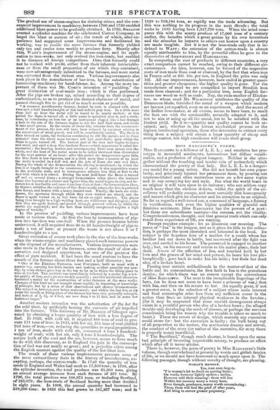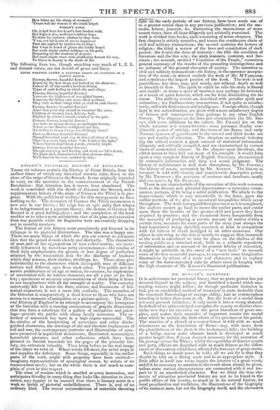MISS RADCLIFFE'S. POEMS.
Miss Muserarre is a follower of L. E. L.; and emulates her pro- totype in mournful sentiments, harmonious but diffuse versifi- cation, and a profusion of elegant imagery. Neither is she alto- gether without the touching and tender vein of melancholy which characterized the poetry of that lady. But L. E. L. is a danger- ous model for a young writer. She did not benefit her own popu- larity, and grievously injured her permanent fame, by pouring out unpremeditated and often matterless verse on a few same topics and in one unvarying key and style. But what the world bears in an original it will turn upon in an imitator ; who can seldom copy much more than the obvious defects, whilst the spirit of the ex- cellence will probably escape, and most certainly that homogeneity and nature which give its character and its attraction to an original.. So far as regards a well-tuned ear, .a command of language, a fluency in versification, with even the higher qualities of graceful and feminine sentiment, Miss R.I.DCLLFFE has the powers of a poet : but these are subordinate matters—the carcass, not the vitality. Comprehensiveness, thought, and that general truth which. can only. result from experience of life, are wanting.
Precept requires example : let us illustrate our meaning. The poem of "Ina" is the longest, and as it gives its title to the collec- tion, is perhaps the most cherished and laboured in the book. Its subject is the hopeless love of a maiden for a youth whom her brother had cut down in battle, but recovered after the fight was over,and carried to his home. The preserved is engaged to another lady ; but, on his recovery and return to his native place, finds her dead. Aware of the affection• of Ina, and touched both by her love and the graces of her mind and person, he bears his loss phi- losophically; goes back to make Ina his bride ; but finds her dead also, of a broken heart.
Passing over certain unlikelihoods in the matter-of-fact of the, battle and its concomitants, the first fault in Ina is the gratuitous deaths ; for which there was no reason except the convenience of Miss RADCLIFFE. The next is the inexplicable lingerings of the hero, (as he does not seem to have, been a prisoner of war,) first. with Lea, and then on his return to her. An equally great, if not, a greater error, is the selection of a subject whose main interest and final catastrophe arise less from any sufficient cause in the action than from an internal physical weakness in the heroine ; (for it may be suspected that some morbid derangement always exists in a youthful person who dies of a broken heart ; the alleged trouble only developing the seeds of disease, or perhaps the nervous constitution being the reason why the trouble is taken so much to heart.) These are errors of design, which scarcely any execution could atone for : but the execution is faulty ; the bulk being out of all proportion to the matter, the sentiments dreamy and unreal, the conduct of the story (or rather of the narrative, for story there is properly none) inartificial.
" The Sacrificed," though much shorter,, is based upon the same bad principle of inventing improbable misery, to produce an effect which after all it never attains.
There is, however, the germ of poetry in Miss RADCLIFFE'S little volume, though overwhelmed at present by words and girlish fancies of life, or we should not have bestowed so much space upon it. The following passages, though without novelty of thought, are pleasing, womares MEMORY.
Yes, man soon forgets.
'T is woman's lot to dwell on parting looks ; On words, however lightly spoken ; smiles, However cold their meaning : these will live Within her memory many a weary hour, Even though, perchance, scarce worth remembering :
These, these will feed the grief of after years, And bring to sorrow greater poignancy.
Bow bitter are the stings of memory ! 'There well for woman if she could forget.
woataa's LOVE.
Oh, it had been her heart's first fondest wish, Her highest aim, ambition's loftiest hope, To share his sorrows, wbatsoe'erthey were. 'T was not his hours of sunny happiness That she aspired by tenderness to bless ; But 't was in hours of gloom she fondly hoped Her smile might scatter radiance on his path, Dispersing all the shadows of despair;
Her band might strew with gladdening flowers his way,
To bloom in beauty in the waste of life.
The following lines too, though smacking very much of L. E. L. and Annual verses, are not devoid of grace and fancy.
LINES WRITTEN. UNDER A PAINTED GROUP OF FLOWERS IN A.
LADY'S ALBUM.
Flowers, flowers, beautiful flowers!
Kissed by the dew-drops and bathed by the showers ; Fairest of all this earth's loveliest things, Types of each feeling to which the soul clings.
Flowers, flowers, beautiful flowers!
Yours are the brightness of sun-gilded hours; Yours are the balmy airs, yours their perfume, They waft on their wings what ye shed in your bloom.
Flowers, flowers, beautiful flowers !
Alas! that your stay should be transient like ours; Children of summer heat, delicate, frail, Blighted by winter's breath, crushed by the gale.
Flowers, flowers, beautiful flowers !
Are there no sylvan shades, no sunbright bowers, Where ye can flourish uublighted and fair, No storms to sweep o'er ye too chillingly there ?
Flowers, flowers, beautiful flowers !
Though-transient your stay in this cold clime of ours, There is a sweet land, where "the Lamb is the light," Where flowers shall bloom purely, eternally bright.
Flowers, flowers, beautiful flowers !
Though changing, and fleeting, and short our life's hours, We know that, transplanted to that glorious clime, We'll flourish for ever, unfaded by time.



























 Previous page
Previous page